#Imagine...Russell T. Davies: The Doctor and Me
Text
'Catherine Tate reveals that Doctor Who's 60th-anniversary ending initially took her by surprise. The star first joined Doctor Who as a guest in 2006's seasonal special "The Runaway Bride" before returning as the companion to David Tennant's Tenth Doctor in season 4. Tate and Tennant reunited to lead the show's 60th-anniversary celebrations across three adventures that saw a new Fourteenth Doctor (played by Tennant) once more with Donna, facing warring aliens, horrors from beyond the universe, and a powerful foe from the Time Lord past.
With a newly bi-regenerated Fourteenth Doctor joining the Noble family for a calm, normal life on Earth, Tate admitted in the BBC documentary Imagine... Russell T Davies: The Doctor and Me (via RadioTimes.com) that she had expected a tragic fate for the two characters. While Donna's fate defied Tate's Doctor Who return expectations of a tragedy, she ultimately feels that the ending was the best choice for both characters. Check out Tate's response below:
"It was so not what I was expecting. I thought there was going to be a massive, terrible final thing. [But] to end in the garden eating crumble is, of course, exactly where they should be."
What Comes Next For The Noble Family In Doctor Who?
Donna's potential fate became one of the most highly speculated points of Doctor Who's 60th-anniversary storyline. The character has endured so much tragedy, especially after season 4's conclusion left her at risk of a horrible death should she remember her adventures. Even "Wild Blue Yonder" almost ended with the Doctor rescuing her Not-Thing duplicate and nearly leaving the real Donna behind to be incinerated as the mysterious vessel self-destructs. However, despite the chances of her death being higher than ever and even showrunner Davies teasing a horrible fate, Donna survives, recovers from her Metacrisis transformation, and her faith in the Doctor is proven correct as he never let her down.
Ultimately, with the Doctor and Mel (Bonnie Langford) joining their family, the Nobles settle in France in the Doctor's new home, enjoying a quiet, peaceful life without having the fate of the universe on their shoulders. Davies has confirmed the Fourteenth Doctor is grounded for his foreseeable future and isn't set to take any joyrides into a Dalek fleet or stumble into a historical event, suggesting that he is content to live out what time he has left with his best friend. But that doesn't mean all members of the Noble family won't stumble into the Fifteenth Doctor's (Ncuti Gatwa) path, as Yasmin Finney may potentially return as Rose Noble in future Doctor Who adventures.
As part of a fan-favorite TARDIS team, the potential of Donna's Doctor Who return had viewers both excited and nervous about what may be. Not only could the character face certain death at the mere sight of an alien, but if mishandled, her return could negate the bittersweet but touching note that she and the Doctor parted ways on with his gift in "The End of Time." However, with Donna and the Doctor reunited in a comfortable life surrounded by loved ones, it is clear that Doctor Who's 60th-anniversary ending has left audiences and the cast satisfied.'
#Donna Noble#Catherine Tate#Rose Noble#Yasmin Finney#David Tennant#Ncuti Gatwa#Bi-generation#Doctor Who#60th Anniversary#The Giggle#TARDIS#Russell T. Davies#The Runaway Bride#Imagine...Russell T. Davies: The Doctor and Me#Wild Blue Yonder#Melanie Bush#Bonnie Langford
22 notes
·
View notes
Text
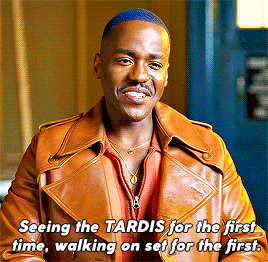

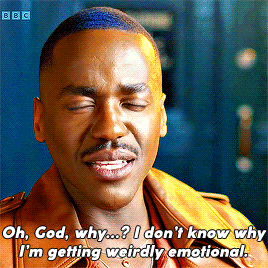
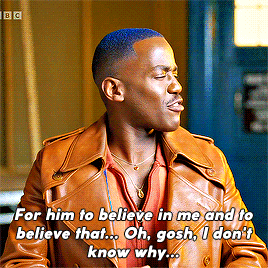


Ncuti left that room, and we were dying to just run after him, saying, "Don't accept any other job!"
#dwedit#timelordgifs#dwgif#doctor who#ncuti gatwa#15th doctor#fifteenth doctor#imagine … russell t davies: the doctor and me#original#*gifs
769 notes
·
View notes
Text
Rose and River
I just watched "The Husbands of River Song".
Ohhhh boi
I really like their dynamic, and I also cried. Like, it was the end for her. She knows she might never see him again.
Anyway.
From all the people he traveled with, The Doctor was in love with 2 of them: Rose Tyler, as the 9th & 10th Doctor and River Song AKA Melody Pond, as 11th, 12th & 13th (I think). They never crossed. And I thought about an interaction between them.
So, another timey-wimey thing, the universe collapses etc., and there's two Doctors again. Doesn't matter which one, but let's say it was after Rose was left with half Doctor half Donna. Just before the goodbyes. And on a Date of the Doctor & River. Doo we doooo ~~
The Doctors: Oh, this isn't good. Not good. Physically- pimisically, timey-wimey, spacy-wacy...
River: Hol up, you're Rose Tyler?
Rose: .. Yeah, and you are? How do you know me?
River: Oh! I'm from the future. Well, considering we were technically in the past... I'm from the Doctor's future.
Rose: That's nice. Does he talk about me?
River: Not much. But the TARDIS does. She loved you dearly.
Rose: :D
Rose: How did you two meet?
River: Oh, I'm kind off.. A daughter of one of his future companions.
Rose: Okaaay
River: And part Time Lord, since I was conceived on the TARDIS.
Rose: That's - wierd. But ok -
River: AndI'mTachnicallyHisWife.
Rose: Sorry?
River: Weeeeell.. I know there was a thing between you two and you loved each other but under the circumstances of the time we were in -
Rose: Good Lord I'm so thankful he has someone after I'm gone!
River: ...
Rose: Do you hit him when he does the -
River: Oh sure I do. Did he ever -
Rose: Oh yeah he did!
The Doctors: *Sees his wife and girlfriend laugh and get along* That can't be good.
I Just can't imagine them being anything else than buddy-buddy with each other and completely pissing him off. Just, girlfriend and wife of the Doctor! I really want an episode like that.
#the doctor#doctor who#river song#melody pond#9th doctor#10th doctor#11th doctor#12th doctor#13th doctor#rose tyler#tardis#no but really#imagine#girlfriend and wife of the doctor#get this to steven moffat please#or russel t davis#steven moffat#russel t davies#I like their dynamic#rose: listen to you wife!#river: do as your girlfriend says!#the doctor: god smite me#*giggle*#shitpost
10 notes
·
View notes
Text
Рассел Т. Дэвис и Дэвид Теннант о регенирации Десятого Доктора и его последней реплике
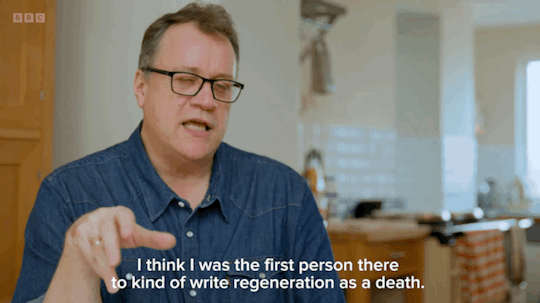



Рассел Т. Дэвис: Я думаю, я был первым, кто написал регенирацию как смерть.
Дэвид Теннант о последней реплике Десятого Доктора:
"Он [РТД] упомянул о ней за месяцы до регенирации. “Я знаю, какая у тебя последняя реплика, и ты ни за что не догадаешься, что это будет”. И я не догадался. Даже близко не смог. А когда я прочитал её, сказал: “Ну конечно”.
Потому что это последняя фраза Доктора, или последняя фраза Десятого Доктора, это также моя последняя фраза и это последняя фраза Рассела.
Я думаю, что она откликается в каждом из нас".
#Рассел Т. Дэвис#Дэвид Теннант#Доктор Кто#Десятый Доктор#Imagine… Russel T Davies: The Doctor and me (2023)
1 note
·
View note
Text

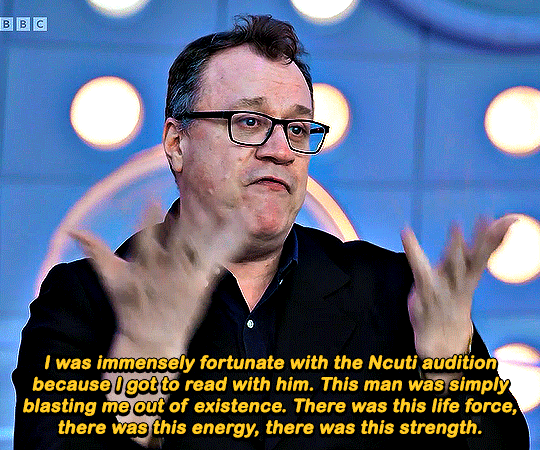


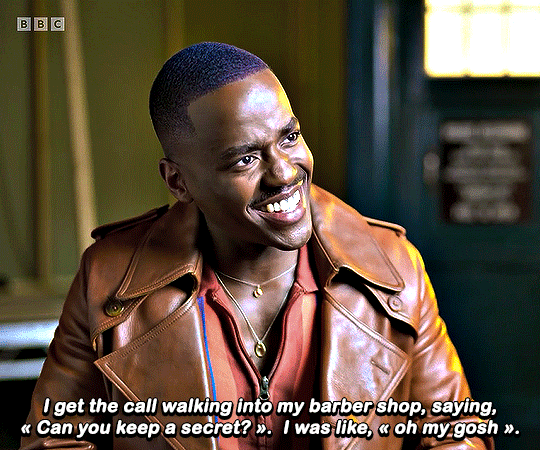
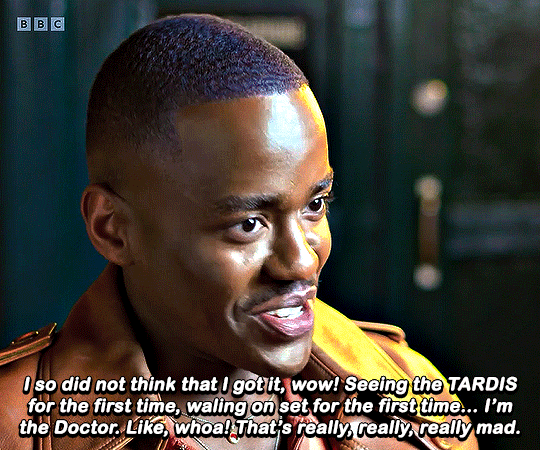
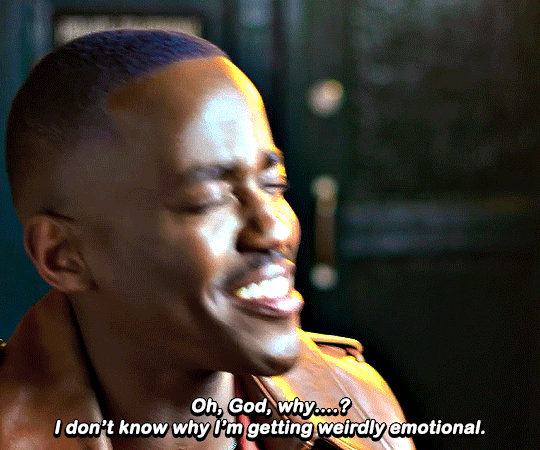
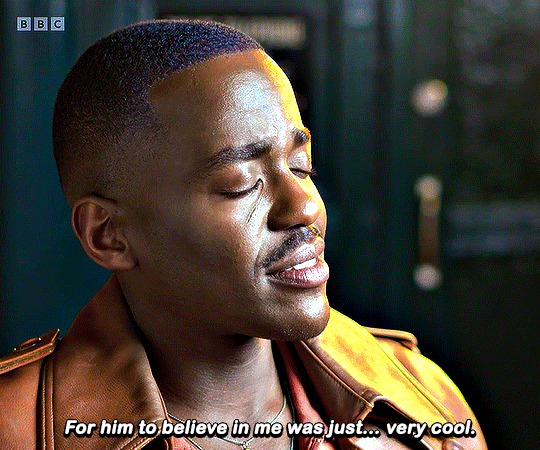
Imagine … Russell T Davies: The Doctor and Me (2023)
#russell t davies#ncuti gatwa#imagine...#byaurore#usersugar#userbbelcher#usereena#userrlaura#userisaiah#doctor who#dwedit#userelio#tuserpris#tuserhan#userveronika#jemmablossom#alivedean#arthurpendragonns#userdiana#timelordgifs
5K notes
·
View notes
Text
Dance, Magic Dance: The Church on Ruby Road
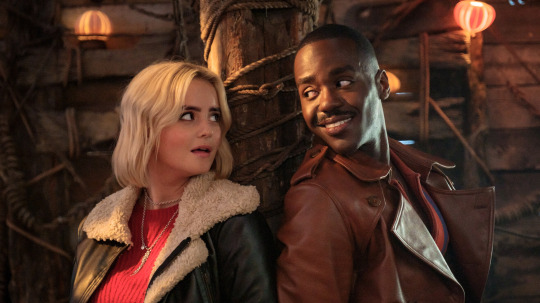
With the return of Russell T Davies we were given a “new” Doctor Who logo with their revamped take on the classic diamond logo. The diamond logo is everywhere now. Books, web content, episodes, and more are stamped with it. Everything except for the “Doctor Who: The Collection,” blu-rays which continue to display the Jodie Whittaker era logo. The reason for this is simple- spines. Most people display books and physical media with their spines facing outward. If you were to change the font on those spines, they lose their uniformity. For some people, that shit is infuriating. It’s not just Doctor Who fans either. The infamous plastic Homer head box for The Simpsons’ sixth season DVD is still controversial. If Doctor Who fans can get upset about a blu-ray spine, then imagine how they might react if you were to change the Saturday time slot to a Sunday. Or even more brazenly, imagine changing the Christmas episode to a New Year's Eve episode. Should be super easy, barely an inconvenience. Right?
It had been six years since Doctor Who last aired a Christmas special. While I have come to appreciate the importance of a Christmas episode within the fandom, I argued in favour of the change at the time as I am not the biggest fan of Christmas. I have history with the holiday, like many of us do. New Year’s Eve also pertains to time, so it made some sense. And for as cheerful as they tend to be, Doctor Who Christmas specials were becoming a graveyard of regenerating Doctors. I get that Christmas is about renewal, but watching the Doctor die on Christmas isn’t my jam, especially if they’re surrounded by a bunch of tacky Christmas decor. Only one other time do we see a freshly regenerated Doctor at the beginning of a Christmas episode and that was David Tennant in “The Christmas Invasion.” It also consistently ranks as the best of the RTD Christmas specials. Though I believe “The Church on Ruby Road,” may soon challenge that.
Before I get into it, I want to preface this by saying I was on my third flute of Buck’s Fizz by the time the episode started. I don’t usually drink alcohol when I’m about to watch a film or TV show. I once went to see Terry Gilliam’s “The Brothers Grimm,” while drunk and it was a bad time on two fronts. But this was Christmas, I was feeling a bit jolly. I only mention this because I may be a bit fuzzy on the details. It’s funny then that the details are another reason I’m feeling a bit fuzzy. Last night, when I should have been asleep, I was researching runes, glyphs, and symbols in an attempt to identify the symbols drawn on the Doctor’s fingernails. That’s how intriguing this new era of Doctor Who is- it’s got me doing research into the early hours of the morning.
Where I first noticed the symbols drawn on Ncuti’s fingernails was in the below promotional image. They looked like some fan had put them there, but when I saw that it was official, I felt a stir inside. Part of me mourned for the kids who have parents like my mom who would see those symbols, call them Satanic and forbid them from watching Doctor Who. The other part of me questioned their function. I know Ncuti Gatwa is an avid follower of the zodiac, so I was braced for it to be that simple, but I had hoped it was something more. In my research, I had trouble finding an exact match for the two clearest runes in the picture. The character on his ring finger looks a bit like the number three in Psalter Pahlavi or like something from Linear A. While the crescent shape on his middle finger looked a bit like the alchemical symbol for platinum or the zodiac symbols for the Sun and Moon. When you’re a time and space travelling alien, your zodiac and table of elements must reach beyond our solar system. They could be alchemical symbols for Dalekanium or the zodiac symbol for Gallifrey. Maybe with this new magical Whoniverse, the Doctor now writes talismans on his fingers for protection.

It’s an enchanting prospect that we get to discover this new magic through the eyes of a new Doctor and companion. There’s a sort of levelling of the playing field for us as fans to come into this new chapter of Doctor Who slightly off our bearings. Who better to lead us through the chaos of magic than the Doctor himself? If his fingernails are a sign of this change, then he’s already got a leg-up on us, which is an exciting place to be as an audience. It’s so easy to be a pedantic know-it-all when the answer is always “Aliens,” but what about all those times a wizard did it, or in this case, the Toymaker?

Our introduction to Ruby Sunday was a bit surprising. Leaving her on a church doorstep felt like a page out of the Steven Moffat playbook of fairy tale magic. But also grounded in the character development we got with Rose, Martha, and Donna. Ruby’s backstory is a mystery, but her agency is not. Ruby has friends, a band, and a family. We’ve known her for 55 minutes and I already have a decent grasp on who she is as a person. She has a compassion for Lulubelle which goes beyond being kidnapped by Goblins. You can see she feels a kinship as a fellow foundling. She knows how it feels to feel disconnected from her history. Similarly, the Doctor can look at both Ruby and Lulubelle and see himself on their faces. He too was adopted after being left behind.

I enjoyed this aspect of the story as my own family is touched by adoption. My mother found out she was adopted after her adoptive parents died. Coincidentally, she had already adopted a little girl from China a year or so prior. I now have three adopted siblings and I love them all. It means a lot to me to see them portraying Ruby’s family as a realistic depiction of an adopted family. Her adoptive mother, Carla, is as good a mother as one could hope for. When she admits she was nervous about Ruby finding her biological mother, it’s understandable. She doesn’t want to ruin the beautiful family that started when Ruby came into her and her mother Cherry’s lives.
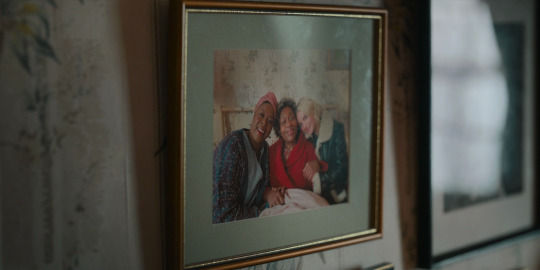
The Davina McCall scene may be the weakest part of the episode. Aside from the prologue, it’s basically the first scene, and much like the other opening scenes in the RTD2 era, it’s a bit wonky. The dialogue lends itself to Ruby’s nervousness being interviewed, but “foundled,” is a bit too close to fondled for my tastes. It’s VOR all over again. The main takeaway from the interview is that Ruby was the baby left at the church (no surprises there) and that Davina’s people are going to try to find her birth parents. Sadly, as we come to find out, Ruby’s parents prove to be untraceable. The interview is cut short when the mics begin picking up the sound of Goblins. I feel like the only reason they were Goblins is because pointy-eared mischief makers called Gremlins ruining Christmas was a bit too close to a certain ‘80s movie. Better to go for a story with musical numbers about Goblins who steal babies for the Goblin King. No ‘80s movies infringed there… wait a minute. I kid of course, there’s nothing wrong with paying homage to the classics.
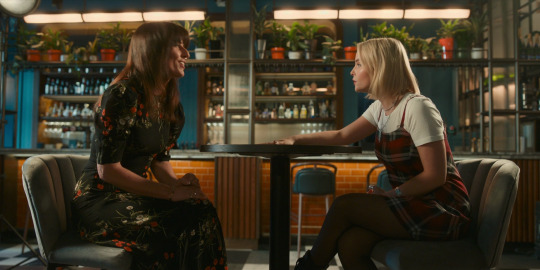
Before we get too far from the interview scene, I want to talk about Denzel. No, I don’t mean America’s sweetheart, Denzel Washington, I mean the sound guy. Was I drunk, or did Ruby mention he asked her out? I’d heard rumours she was going to have a bit of a love triangle with her boyfriend and the Doctor. I wonder if it’s not him. It would be weird to have a sound guy with a unique name who gets mentioned again if it’s not going to come back into play. I think this might enter the territory of the controversial aspects of the season that Millie Gibson alluded to recently. It’s funny then that the part of me that finds any of that controversial is the part of me that hates the idea of the Doctor being romantic with companions. I’ve never enjoyed it. Rose and Ten? Blech. Yaz and Thirteen? Snore. Representation matters, sure, but what about asexual and aromantic representation? I get that people might fancy the Doctor, especially when they look like Ncuti Gatwa, but I hope the Doctor continues to ward off any advances.
Speaking of representation, I would like to take a smidgen of a moment to talk about Trudy. As a trans woman, it was nice to see her living her best life. Simply letting trans characters exist is better representation than what we got in “The Star Beast.” They didn’t even pat themselves on the backs about it in “Doctor Who Unleashed,” as I worried they might. Regardless, some cis people think that any trans representation is shoving it down their throats. They reject the reality that for many people, trans people are a part of their daily lives. If your average person took the time to learn people’s pronouns, they’d see we’re everywhere. We’re not trying to shove anything in your face. Trust me. You’re not our type.

As I said above, it’s nice to see Ruby’s life play out over this montage. You learn a bit about her life and what she gets up to. Though when I heard she had a band, I was hoping for something more punk than Christmas standards. Ncuti dancing on the dancefloor was joyous, a word which I find myself using about him a lot lately. I love the embracing of his Scottish upbringing with his kilt. When I read RTD’s Doctor Who Magazine article talking about the Doctor dancing, I worried a little bit. Sure, the Ninth Doctor proved the Doctor dances, but I worried the scene would make the Doctor feel too sexy or too human. The Eleventh Doctor’s terrible dancing garnered the name “The Giraffe,” because it was so unflattering. But the Fifteenth Doctor pulls it off in a way few others could. However, I do still take issue with one aspect of that scene and that’s Ruby leaving her drink unattended in a busy club. There are worse people than Goblins mucking about with drinks, Russell. Let’s make a good example for the young members of the audience.

The montage of the Doctor watching Ruby from afar was actually a note from Disney. Test audiences wanted to see the Doctor earlier, and I don’t disagree. In the words of Werner Herzog’s Mandalorian character- “I want to see the baby.” It also explains why we recently saw footage of Ncuti punching through a snowman head when principal photography had ended months ago. This, of course, was due to further meddling from the Goblins, who appear to be everywhere now. They’re like bedbugs who pass from person to person. I loved the line “A pram at midnight. Really?” Such a cheeky Doctor already. Gatwa gives vibes of previous Doctors throughout the entire episode, but the snowman head scene gave us one I didn’t expect. The Doctor telling the policeman to ask his girlfriend to marry him reminded me of the Eighth Doctor’s penchant for fortunetelling. Only this time, he’s not weirdly omniscient, but rather making a wild assumption after his sonic pinged a diamond ring, which is a thing it does now, evidently.

The Doctor’s new sonic screwdriver has been a bit controversial, because what isn’t in this fucking fandom lately? I get the argument that it’s just not to your liking, that’s fair. But I’ve seen some monumentally dumb takes on the subject. I saw someone complain that it wasn’t shaped like a screwdriver. I hate to break it to you, but none of them have been shaped like a screwdriver. Show me on the Third Doctor’s where you fit the Phillips head. I’ve also seen people complain that it looked like tech from the early 2000s. So their biggest complaints are that it looks weird and out of time. How inappropriate for an alien time traveller. Regardless, I loved seeing Fifteen using his assorted gadgets. His intelligent gloves feel like a natural fit amongst his classic instruments and I can see them coming in handy further down the line. There’s also something about seeing the Doctor pull out the psychic paper that brings it home for me. It’s like seeing the Doctor square off with their first Dalek. It makes them feel complete. I know RTD said they’re giving the Daleks a rest for a bit, but I hope we do get to see Ncuti officially call one a “detty pig,” before he bows out.
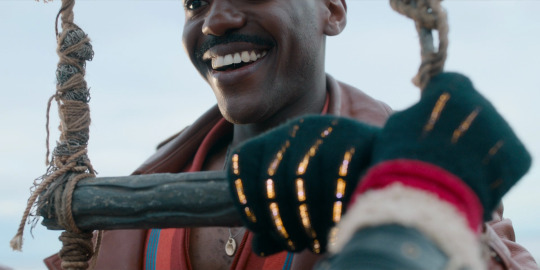
The Goblin ship was a great way to introduce us to the new magical aspect of the Whoniverse. Not just because it’s fantastical, but also because the Doctor wasn’t able to use his shiny new screwdriver on it. Had it been a normal spaceship with metal and wires, he would only need to point and click. But this ship is all wood and rope, rendering the sonic mostly useless. The Goblins force the Doctor to learn the science of luck, but the ship causes him to learn the language of rope. I adored watching Ruby and the Doctor bicker while he was busy learning about the ship. They’ve not been together five minutes and they’re already getting tied up by baddies. They have an instant Doctor/companion relationship and it’s obvious why they were paired together. Furthermore, Ncuti’s detachment from the danger of the situation, coupled with an admiration for the Goblins’ tech was pure Doctory goodness. I could easily see Tom Baker fiddling with rope while Sarah Jane complained that he was goofing off.

Because of the charity release of “The Goblin Song,” many of us had become intimately familiar with it before the episode. What I doubt many of us were expecting was for Ncuti and Millie to join in on the singing. While I’ve not heard anyone complain about this, I’m sure someone has. To me, it worked. For starters, it’s a Christmas episode. Secondly, the Goblins have a band. It makes sense that the Doctor would try to win them over by speaking their language. It seems to work as the Goblins dance along with the Doctor and Ruby. Much of their logic seems dictated by whimsy. They sing and dance. They cause mischief. And they are attracted to coincidence. It’s not just that Lulubelle is a baby, it’s that she’s flavoured by happenstance. Both she and Ruby are foundlings left on Christmas Eve. It’s like the sound of a dinner bell for these little munchers. While the singing and dancing worked for both the scene and the Goblins, I hope RTD continues to use it sparingly. While I expect to see it return with the Beatles episode, I don’t want the concept to wear out its welcome. Doctor Who can afford the odd musical episode, but let’s not go crazy.

With Lulubelle saved, the Doctor and Ruby get her back home before Carla or Cherry ever notice she’s gone. This gives the family a chance to meet the Doctor, starting with Cherry. Cherry’s reaction to the Fifteenth Doctor was an understandably thirsty one. RTD kind of wrote himself into a corner by casting Gatwa. It must be exhausting to begin every scene with “The Doctor enters the room and people are immediately enamoured.” He exudes charisma in a way that makes you stop looking at David Tennant. Remember the bi-generation scene? Little known fact, but Tennant was also in that scene. Another enjoyable aspect of the Cherry scene was seeing the Doctor flirt back. I know I said I dislike a romantic Doctor, but it was nice to see it with someone more age-appropriate. I kid, but what I did like about the scene was that he spoke to her as if she were a young woman. Because for him, she is. And even further, it didn’t feel like that cutesy old people flirting like “If I were younger,” bullshit. It makes sense that a time traveller would find whoever a person is in the present the most important. You can travel to the past or the future, but it all pivots along you in the present. We stand outside past and future versions of ourselves. To me, this is why the Doctor is compassionate, he sees the pivot people are capable of making. Can you now pivot beyond a dark past into a bright future?
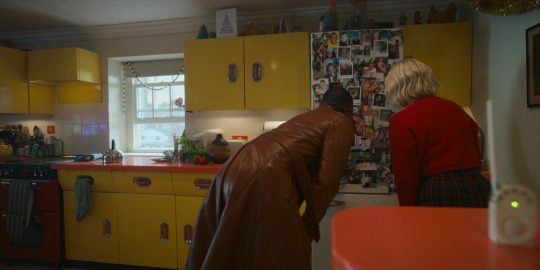
The meeting between Carla and the Doctor was less flirtatious. Carla seemed open to this eccentric Doctor while keeping a concerned mother’s distance. The ironic thing is that not only is the Doctor like Ruby and Lulubelle, but he’s also a lot like Carla. Both of them know the weight that comes with what the Twelfth Doctor would call “duty of care.” Like the Doctor’s long list of previous companions, the photos on Carla’s fridge tell a story of lives touched. This is why when things go bad and Ruby disappears, the missing photos on the fridge cut us to our core. Michelle Greenidge floored me with her performance here. Seeing her claim her life is great because she has no responsibility was harrowing. We’ve seen her real truth. She’s a centre point of light illuminating the lives of many, not this selfish woman in it for the paycheck. Even Cherry now feels forgotten in the other room, waiting out the clock. This is a reality the Doctor cannot tolerate.
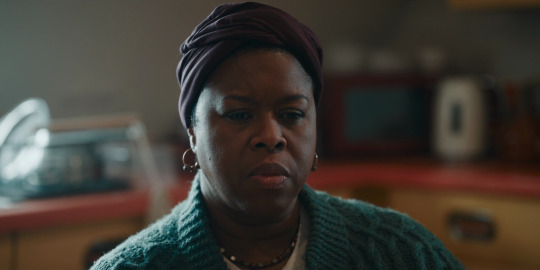
Not only are the Goblins little baby-stealing monsters, but they’re also time-hoppers, whatever the hell that means. How it differs from time travel probably has more to do with a Time Lord’s concept of elegance than anything else. But like the Daleks, I doubt Goblins have much of a concept of elegance. If anything it’s a warped admiration for coincidence. And if a baby Lulubelle isn’t a viable meal option, then the other side of that coincidental coin, baby Ruby, would have to suffice. After all, I’m fairly certain if they don’t feed the Goblin King soon, he’s going to start wooing Jennifer Connelly at a masked ball. The Doctor travels back to that church on Ruby Road. Tears still running down his face, we see the mysterious woman leaving Ruby behind. Is it her mother? Is it a younger version of the mysterious Mrs Flood? Is it Ruby herself? The Doctor doesn’t have the time to go chasing after her. He has Gobbos to stop.

Floating above the church steeple like Bowser’s airship, the Goblins begin hauling Ruby onboard. The Doctor climbs to the church roof where he puts the last spark of power in his intelligent gloves to the test. Instead of climbing up to the ship, the Doctor begins pulling the ship back down to earth by its rope ladder. However, the ladder is more likely to give out before his gloves do. So in a last-ditch effort, the Doctor brings all of his weight down using the gloves’ ability to increase mavity (I know) on the ladder. The ship plunges onto the church steeple which stabs up through the hull and into the belly of the Goblin King. With his influence and magic now dispersed, the ship and all of its Goblins disappear with it, leaving baby Ruby in a freefall. No pressure. The Doctor of course catches her using the gloves to cushion her fall. It was all a pretty lucky gamble considering the steeple could have just as easily hit Ruby, but luck is now a tangible thing, so maybe it was lucky. You could say “The Doctor killed a guy,” but you could also say this was the Goblin King’s second chance, and as you remember- “No second chances.” It would appear that the Doctor is still that sort of man.

With the Goblins gone, neither Ruby nor Davina McCall will be plagued with bad luck. Davina even gets so lucky as to have the Doctor appear just in time to prevent her from being brained by a Christmas tree star. The pictures on the fridge are back, and so is the giant crack the Goblins left when they attempted to kidnap Ruby. It makes you wonder just how Carla and Cherry will fair with squirrels getting in through the roof while Ruby is off exploring all of time and space. Does insurance cover acts of Goblin? Who knows, maybe Kate Stewart will stop by with a restoration team. All the Doctor would need to do is make a call. Mrs Flood returns to commend the Doctor for a better parking job. Is it just me or was that a subtle hint of disability representation? A subtle reminder not to block the pavement for the elderly and disabled.
I liked that the TARDIS appeared to invite Ruby inside by opening her doors to her. You could say the Doctor flipped a switch, but he was busy doing his fourth costume change. I like to think she was giving her seal of approval. I never quite understood why the TARDIS didn’t like Clara. It seemed to come out of nowhere. The TARDIS was like, “I dunno why, but I don’t like this bitch.” I guess you could say the whole Impossible Girl thing made her competition, but now it’s just starting to sound like Moffat writing women. But the TARDIS and Ruby? Just gals being pals. Sisters before misters. Empowered women empower women. Yas queen.

In the end, we’re left with Mrs Flood comforting her neighbour Abdul after he sees the TARDIS dematerialise. She gives the camera a devious smile as she says “Never seen a TARDIS before?” This of course is the classic Davies Easter Egg. He knew the fandom would blow up. And dammit, after almost twenty years of saying it, it had better be the Rani. Some people have said Romana or Susan, but she feels a bit more sinister. Besides, if it’s Susan, I’m going to be disappointed because Carol Anne Ford is still alive. If it was Susan, we’re owed a flashback to her regeneration. The reason she feels slightly sinister is the way she gaslights Abdul about the TARDIS. She yells at the poor man like he parked the thing in front of her house even though she apparently knows what it is. Conversely, she could be nobody we’ve seen before. Perhaps she’s an Eternal or “the Boss.” Either way, I’m intrigued.

Ncuti Gatwa is finally the Doctor. It almost feels unreal to be able to say that. Not only have we waited a long time to say it, but what an exciting Doctor he is already. He brings an invigorated energy to the performance. He's full of charm and I can't picture many Doctors pulling off a curtsy as well as he did. I’m still waiting for him to get a bit scary, but his amazed reaction to seeing Goblins about to eat a baby shows me he’s capable of it. I would like to see them show his age a little, but there’s still loads of time. His conversation with Cherry gave us a glimpse at the ancient being behind his eyes, but I would like to see more. While the Doctor may still have hang-ups about his past, it would appear his time with Donna was a time of emotional healing. The Doctor isn’t afraid of his emotions and it’s been a bit of a revelation just how much I like that. This Doctor wears his hearts on his sleeves and it’s surprisingly refreshing. It’s a far cry from “I'm still quite socially awkward,” and I couldn’t be any happier about that. We have a new Doctor. A new companion. New rules. Is anyone else excited for May?
#Doctor Who#Ncuti Gatwa#Fifteenth Doctor#Millie Gibson#Ruby Sunday#Carla Sunday#Cherry Sunday#Goblins#Goblin King#Christmas Episode#Christmas Special#Mrs Flood#Anita Dobson#Michelle Greenidge#Angela Wynter#14th doctor#Davina McCall#Trudy#Mary Malone#Denzel#Bobby Bradley#Russell T Davies#RTD#BBC#TARDIS#timeagainreviews
58 notes
·
View notes
Text
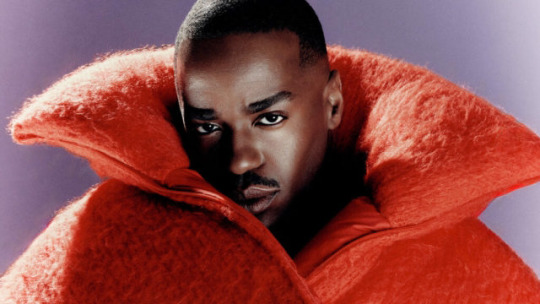
Ncuti Gatwa’s Rolling Stone article, the Doctor Who bits
“My Doctor is emotionally vulnerable. He hides it with humour, but he’s lonely,” says Gatwa of his forthcoming reinvention of the ever-changing Doctor. “I can’t say much more than that; I don’t want to spoil anything. But he’s also energetic! The poor cameramen struggled to keep up.”
To hear Gatwa tell the story of his casting, it almost sounds like he was granted a wish. One day he emailed his agent saying he wanted to play a role like Willy Wonka or the Doctor — and just a week later he was asked to audition for the part of the Time Lord. To prepare, Gatwa spent a week watching every Doctor Who episode since its 2005 revival. Although he had enjoyed the show previously, he never considered himself a habitual fan. He emerged from that binge-watching week a die-hard Whovian.
“I fell in love with it,” he enthuses, and he means it. There is undoubtedly a special quality about Doctor Who that’s hard to deny. “When you watch it, you forget all your troubles,” says Gatwa. “You go to space, or to another time. You have adventures.”
A big part of the show’s post-2005 story revolves around the Doctor having survived a devastating war that wiped out the rest of his people. This is a plot point that has since been undone and then redone; its current status in the canon is somewhat unclear. But it’s this that Gatwa latched onto because in that storyline he was able to see a reflection of his own life. As a child, Gatwa and his family fled Rwanda, escaping the genocide against the Tutsi minority. They settled in Scotland. “This person survived a genocide. This person fits in everywhere and nowhere. I am the Doctor. The Doctor is me. I decided that I had to get this role,” says Gatwa.
“I’m very nervous. I have a lot of sleepless nights where I lie awake feeling my heartbeat,” he says. It’s hard to imagine the pressure he must suddenly be feeling, but it’s understandable nevertheless. Doctor Who is a science-fiction family show that has run, on and off in some form, for 60 years. It’s also a nexus of so much of British culture. Like James Bond, the Doctor is a character through which Britain learns to understand itself, as much an icon of our changing times as a fictional being. The show’s connection to British identity means tensions can run high and fans can be cruel at times, seemingly over-protective because they feel that the show is something they own. They can also be bigoted in the most predictable ways.
“I’m the first Black man to play this character. The British press can be very mean,” he says of the reaction to his casting. But Gatwa is determined to remain steadfast in the face of criticism. “I just have to focus on the job and stay true to what the Doctor is: a mad scientist alien who has adventures and cares about everyone,” he says.
Thankfully, the Doctor Who team are helping him handle the pressures that come with his new role. “Russell T Davies has been amazing, too. He calms me down. He’s such an Earth sign. I can get very anxious, but therapy helps, and they’ve made sure that I have time put aside to have my sessions.”
Gatwa has also drawn support from some of the past Doctors, and has met Peter Capaldi, David Tennant and Matt Smith in person. He ran into Smith at a party before he’d been announced for the role and tipsily said “I’m following in your footsteps!” — a remark which baffled Smith until Gatwa was officially confirmed as the new Doctor. Gatwa tells me that Tennant set up a group chat where some of the previous actors stay in contact with one another, and they’ve all offered Gatwa support and advice on dealing with the press. After all, the only people that can really know what it’s like to be the Doctor are those who have been the Doctor. Once you’re cast, you’ll always be part of the show’s long history.
The series will return to BBC One (and Disney+ in other territories) in three specials this coming November, all — as far as we know — starring David Tennant once more. Gatwa’s first episode will be in a Christmas special set to air in December.
Doctor Who is all about reinvention and with Gatwa, this bold reimagining can be seen in his aesthetic interpretation of the offbeat time-travelling alien. Fashion might not be the first thing people associate with Doctor Who, but what the Doctor wears is an intrinsic part of the show. Tom Baker’s long scarf, David Tennant’s pinstripe suit; those are things that people immediately associate with it. But Gatwa’s Doctor might well be the first fashion-conscious one. “The day Russell invited me to meet everybody, they asked me what sort of costume I wanted. I showed them this Ralph Lauren collection that was in partnership with Historically Black Colleges in America,” he says. “I love those pieces, they’re so preppy and so Black. But then they asked what else, because they’d been thinking about lots of outfits, almost a different one each week. Which is new! I love it. The Doctor has travelled all of time and space; they’re going to have a sick wardrobe.”
Not that previous Doctors were badly dressed, mind. “I love Jon Pertwee, the Third Doctor’s, outfits. Lovely velvet jackets and frilly shirts. I feel a connection to him, our Doctors are the only two who dress like sluts,” he laughs.
The idea of multiple outfits has led to a fun press cycle where Twitter is regularly treated to a photoshoot of the Doctor and his companion in a completely new style each time. The most notable of these was a Swinging Sixties look, with Gatwa sporting a blue striped suit and an Afro. “The hair and makeup department have been incredible,” he exclaims. “Claire Williams and my own makeup artist, Bella, who is an old friend, worked so well together in creating my looks. Originally, we weren’t going to have the Afro, but Bella convinced me and I’m very glad she did. It’s such a shot into the bloodstream. It’s a statement — the Doctor is fucking Black.”
#doctor who#ncuti gatwa#dw txt#I looove the way he talks about the show/character#how passionate and excited he is makes me more excited
36 notes
·
View notes
Text
Imagine… Russell T Davies: The Doctor and Me (2023)
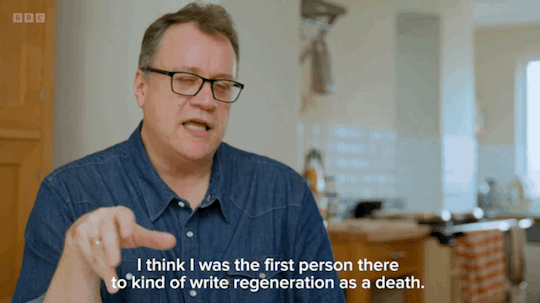

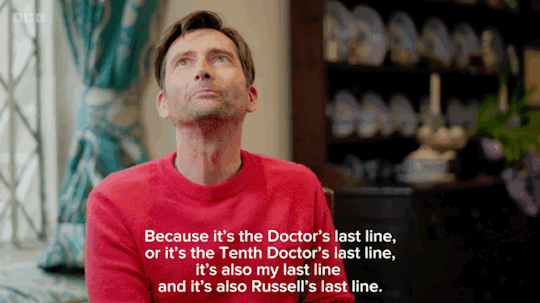

Russel T Davies: "I think I was the first person there to kind of write regeneration as a death".
David Tennant: "He sort of trailered that months before by saying, “I know what your last line is. And you’re not going to be able to guess it”. And I didn’t. I never got close to it. But when I read it, I went, “Of course”. Because it’s the Doctor’s last line, or it’s the Tenth Doctor’s last line, it’s also my last line and it’s also Russell’s last line. And it meant that it reverberated for all of us, I think".
~ Russel T Davies and David Tennant about David's appearance on Doctor Who and his [or their] last line.
#Doctor Who#David Tennant#Russel T Davies#Cried my eyes out while making these gifs#The Doctor and Me#The Tenth Doctor
16 notes
·
View notes
Text
aajkdssfjnvopfc finally getting to the end of season 2 in my glacial-pace dr who rewatch and Army of Ghosts/Doomsday really are THE episodes ever. I was watching Fear Her right before and even just the ‘next time on’ for these episodes was getting me all anxious and now I’ve just finished army of ghosts and it’s like, oh ho ho you thought it was just gonna be a MASSIVE, WORLD-DOMINATING army of Cybermen they’d have to fight???? Guess again, bucko, bc here come the Daleks and they’re gonna absolutely demolish the cybermen in a roast-off so get ready for that. And also David tennant wears paper 3D glasses half the time and you’re not gonna be able to focus on the plot for that reason-- but meanwhile you know full well that tragedy is about to strike!!! You’re told right off the bat that this is the end of the rose+Doctor partnership. And just to really wring the most emotional impact out of it they’re giving them the absolute cutest moments imaginable. They are in true Inseparable Team Mode!!! And I’m watching them be adorable while my brain is skipping ahead to the beach scene and I want to frickin cry already just thinking about it. Russel T Davies you glorious bastard I’m so thrilled you’re running this ludicrous show again because they just don’t make tv like this anymore.
16 notes
·
View notes
Text
Remembering the early days of the DW revival in North America

(You never saw this in the UK or US) (Source)
With the return of Russell T Davies upon us, there’s a lot of nostalgia for the early days of the Doctor Who revival, the years before ... well, name a controversy. Lots of hope in the fanbase that RTD will be able to bring back the feels of the early days (and not just among those who were too young to remember the heady days of 2005-2010). There’s also a lot of hand-wringing over the fact that outside the UK the series will be part of the Disney+ family. But non-UK networks have always influenced the show in a lot of ways.
Not everything was good - I have some real negatives below - but here’s a quick list of memories of the early years of the revival, which began at a time the mainstream in North America was still very much of the mind of “Doctor who?” and dismissed it as a grainy old series that usually aired after Monty Python on PBS after midnight on Saturdays.
I remember:
* When we had to wait months between UK and Canadian broadcasts. Just imagine trying to avoid spoilers today!
* When the Sci-Fi Channel in the US allegedly rejected the show for quality reasons. So many American fans didn’t get to see the first series with Eccleston for about a year (or had to order the DVDs).
* When Series 1 did air in Canada, the CBC had Christopher Eccleston record intros, commercial bumpers and “final comments” that included a mixture of trivia and promos for a “visit the set of Series 2″ contest being done with the Canadian edition of TV Guide (ironic, I know). By the time Christmas Invasion aired, Chris had left so they had Billie Piper do the intros and bumpers for it. They dropped the gimmick for Series 2. Thanks to the TV Guide tie-in, Doctor Who also got its first-ever cover on the iconic magazine, albeit only in Canada.
* When most episodes of Series 1 ended on the CBC with short documentaries and interviews with the Canadian DW fan club; one of them I believe was responsible for spreading the notion that the 1996 TV movie was titled “The Enemy Within” (which was just a suggested title apparently).
* The difficulty in getting the Series 1 DVD sets in Canadian stores due to the “Doctor who?” factor. I recall I had to special order and it cost me close to $100 in 2005 or 2006 money. And at the time only one DVD retailer (back when they could be referred to in the plural sense) would touch it. Amazon wasn’t a thing yet.
* The CBC not airing the part of “World War III” that resolved the cliffhanger of “Aliens of London”. For the CBC that was their “dancing animated Graham Norton” moment.
* How the CBC, after the initial flurry of interest, seemingly forgot about the show (a charge made by the main Canadian DW fan club a few years later), resulting in Runaway Bride airing after Series 3 began, the main CBC never airing Voyage of the Damned at all (leaving the Series 3 cliffhanger unresolved), and airing a 42-minute edit of “Journey’s End” that was totally incomprehensible (and delaying the broadcast until after the DVD release of Season 4). Torchwood likewise was bounced around. Soon after, the CBC cancelled Doctor Who and Space Channel (now CTV Sci-Fi) picked it up, eventually airing Voyage of the Damned and moving to same-day broadcast with the UK. They also picked up Torchwood. (Sarah Jane Adventures only aired on the BBC Kids cable network and either was cancelled or the network folded so we mostly saw it on DVD only; K9 never aired here at all, but again was on DVD.)
* The CBC also never showed the Children in Need minisodes, so I believe we had to wait for DVDs before seeing the prequel to Christmas Invasion and the Time Crash crossover.
* The sea-change when Series 5 arrived; Sci-Fi (Syfy) in the US and Space were now airing it the same day as the UK, though for here they added a US-style prologue to the opening credits with Amy explaining the concept of Doctor Who.
* When Sci-Fi aired Let’s Kill Hitler in the US with a special animated mini-episode during the commercial break promoting a sponsor - something that would be absolutely unheard of on the BBC! (It used to be on Youtube but I can’t find it anymore.)
* The “good old days” when most of the “good stuff” (basically anything involving video or gaming) on the BBC’s main Doctor Who website was “geolocked” and inaccessible to North American visitors. Fortunately this didn’t include the minisodes created to promote Series 2, but people had to sail the high seas (or later turn to Youtube) to obtain stuff like the mini-episode Karen Gillan made as a tie-in with an Amy Pond game and some of the scripted stuff Sarah Jane Adventures had on its site, and the Captain Jack’s Monster Files webseries starring John Barrowman.
A lot of this is in the past - as far as I know there are no longer restrictions on BBC website content (or if there is, it ends up on Youtube in about 10 minutes anyway); same-day broadcast is the norm; it’s easy to get DW-related DVDs and Blu-rays (though it remains to be seen if we ever see anything from RTD 2.0 on permanent media here in North America with Disney+ in the picture); and the idea of Syfy or CTV Sci-Fi - or certainly Disney+ - taking a 75-minute episode and trimming 30 minutes out of it for broadcast as was done to Journey’s End is impossible to imagine. Sadly though, at least for now, the enthusiasm for the show where people did care that Let’s Kill Hitler had an extra scene for the US only, or that Billie and Chris recorded exclusive materal for the CBC ... it too is in the past. I hope RTD is able to restore it and prove you can go home again.
54 notes
·
View notes
Text
'David Tennant reflects on his first Doctor Who tenure, revealing that while he could never guess what the Tenth Doctor's final line would be, he understood how it resonated with an important stage in his life. Tennant is the second actor to play the Doctor in the show's revival, making his first appearance in "The Parting of the Ways". The actor led the series for three seasons and a handful of specials released across 2009, but would rejoin the series as a new incarnation of the Doctor in 2023.
After leading the Doctor Who's 60th-anniversary as the Fourteenth Doctor, Tennant reflected on the final moments of his Tenth Doctor tenure in BBC One's Imagine.... Russell T Davies: The Doctor and Me documentary. In the lead-up to the production of his final story "The End of Time", Tennant never came close to guessing his iconic final words as the Tenth Doctor, "I don't want to go", but truly appreciated the line for how it summarizes the character's journey alongside his and showrunner Russell T Davies' career at the time.
He sort of trailered that, months before by saying "I know what your last line is. And you're not going to be able to guess it." And I didn't. I never got close to it. But when I read it, I went "Of course." Because it's the Doctor's last line, or it's the Tenth Doctor's last line, it's also my last line, and it's Russell's last line, and it meant that it reverberated for all of us, I think.
Does The Tenth Doctor's Final Line Still Hold Up?
As the Doctor stood alone after a lengthy farewell tour in the final moments of "The End of Time", the Time Lord admitted he wasn't ready to change. With Tennant having been the Tenth Doctor for four years, not only had the actor been able to play his childhood hero, but had endeared him to a loyal fanbase who also didn't want to see him depart the role. However, with Tennant having not only returned to Doctor Who as the Tenth Doctor, but an all-new Fourteenth incarnation of the Doctor, it could be argued the impact of the line has been lessened.
While viewers would see Tennant return both on-screen and in Doctor Who's expanded media, "I don't want to go" still remains effective both for those who watched his Doctor, and in terms of its place in the franchise. Within the universe, Tennant stands as the penultimate incarnation of what appeared to be the Doctor's limited regeneration cycle at the time, meaning that it could be interpreted the Doctor's reluctance to change as being due to him entering his final life. But outside the show's universe, "I don't want to go" continues to have an impact on marking the end of an era, as both the showrunner and a star who helped elevate Doctor Who to new heights were prepared to take a final bow.
Regardless of whether the line still holds the same significance as it did upon "The End of Time" released, "I don't want to go" is still a phrase that tugs at the heartstrings of many viewers. Tennant's final Tenth Doctor episode treated the moment as if the series had reached its end, giving viewers one last glimpse at the companions both they and the Doctor cherished. As such, Tennant's recollection is a perfect summary of why the short but bittersweet line continues to impact Doctor Who to this day.'
#“I don't want to go”#The End of Time Part 2#David Tennant#Russell T. Davies#Doctor Who#The Parting of the Ways#Imagine...Russell T. Davies: The Doctor and Me
4 notes
·
View notes
Text
PRIDE: I hear that you’re calling from the UK.
Jinkx Monsoon: Yeah, I'm in Cardiff, Wales. I haven’t begun shooting Doctor Who yet, but I’ve been having meetings and costume fittings. And my god, it’s just… it’s a dream come true. I’ve had a lot of dreams come true recently.
This is so exciting! I know you can’t spill any tea yet, but how excited are you to join the cast and the universe of Doctor Who?
I’m terribly excited. It’s not easy to encapsulate how excited I am with words. I was saying to the director yesterday, the role that I’m playing, it’s like everything I ever dreamed about doing as an actor in one character. It’s insane. It’s like all of my actor fantasies have been rolled into one character, and now I get to do it all on a show that I love, written by a prolific writer, a voice of our generation who has written so many astounding things. And this is just one example of his brilliance, Russell T. Davies. But it’s just… it’s extremely thrilling. And when I was dreaming, when I was a little boy, dreaming of growing up and being an actress, this is what I was imagining.
instagram
I know you’ve been friends with Russell T. Davies. How did that friendship come about and when did you get the call to join Doctor Who?
It was kind of a perfect storm, how we became friends. I was dating my now-husband, Michael Abbott, who’s a good friend of Russell’s. So our holiday show was coming through Manchester at a time that Russell was in Manchester, and my husband reached out and he came and saw the show. And that was maybe four years ago. And then over the years, Russell has come to see many of my shows.
And I’ll tell you candidly, after I was offered the role [on Doctor Who] and I accepted it, Russell told me that he saw my show Together Again, Again with my music partner, Major Scales, which is a show where I play myself in my 80s, a kind of dystopian look at my future. Russell said that he walked home from the show that night and decided, ‘Jinkx is the person I want to have play this role.’ So he advocated for me to play this role, and it’s just one of those moments where everything fell into place at the perfect time. I think old me would’ve been nervous, like, ‘Oh, is he just giving me this role because we’re friends and he’s taking pity on me?’ But with some things that have happened lately, I guess I’m trusting my abilities and my know-how a little bit more. (x)
38 notes
·
View notes
Text
Doctor Who: The Giggle Review- A Whole Glorious Hour of Literally Perfect Television
Warning: Spoilers Ahead
In my previous two Who reviews, I argued that- regardless of the increasing quality of the show- cancellation would still, ultimately, be a kindness. I said this as a fan, because I was aware that the world Doctor Who was built for and the world we presently have are so wildly different that, ultimately, the off-kilter, quintessentially British spirit of the show would have to be traded away to maintain long-term viability. In the wake of The Giggle, I find myself forced to reevaluate this opinion. You see, The Giggle isn’t just a really, really good piece of television- it’s also a blueprint for the series going forward. In this story, showrunner and script-writer Russel T. Davies seems to have hit on a new-but-familiar identity for Doctor Who that can continue to work in the modern world without sacrificing the elements that made it good to begin with.
It would be hard to overstate how fucking great this episode is. Let me see if I can put it into words. I was fourteen years old when Doctor Who came back from its decades-long hiatus and reappeared on the BBC, fronted by the inimitable Christopher Ecclestone. I used to watch those early episodes perched, very literally, on the edge of my seat, my legs trembling involuntarily, ready to run- as though if I sprinted fast enough, I could catch up to the Doctor and enter that world of wild, uncontrolled imagination; that infinity of time and space. That feeling continued throughout David Tennant’s first run as the Doctor, but eventually began to decay. I chalked this down to getting older. After all, nobody watches anything at 20 or 30 the way they watched it when they were 14. I just had to accept that the ageing process had robbed me of my ability to uncritically enjoy something that had meant so much to me in my formative years. And then The Giggle happened, and suddenly I’m 14 again, glued to my chair and grinning like an idiot.
It’s not that The Giggle turned off my critical and analytical faculties by appealing to the nostalgia centres of my brain. It’s too fresh and inventive to pull that cheap trick. Rather, it’s that it’s so joyous and energising that it taps directly into the same part of my psyche that the early episodes did in 2005 while also being so well thought-through and meticulously realised that my capacity for analysis and critique enhanced rather than marred my enjoyment. In my review for Wild Blue Yonder, I commented that it’s harder for TV episodes with a lot of superfluous ideas, characters and concepts to juggle them all successfully- almost like there’s only so much quality to go around and it gets spread too thin. This makes The Giggle particularly impressive. There’s a ton of stuff going on here, but it’s all handled with equal panache and genuine verve. The Giggle makes the juggling of elements feel completely effortless. Spoilers ahead, but I think it’s important to list, out of context, some of the things that happen in The Giggle that left me bewildered, gobsmacked and delighted all at once. And yes, I laughed out loud at many of these, braying like a complete fucking cretin from the sheer, infectious joie de vive of it.
Rhyming murder puppets.
A shop folds itself into a toy-box just to mess with the Doctor and Donna.
The Celestial Toymaker interrupts the plot to deliver a full-on, showstopping musical number.
“It’s alright. I’ve given the moles a force-field.”
A sexy black alien with no trousers whacks a time machine with a croquet mallet so hard that gives birth to another time machine in a slightly different shade of blue.
Grandma’s Footsteps with a motherfucking death-laser.
The fate of the world is resolved with a game of catch.
“I love you. Get out.”
Two chill dudes set fire to a dummy in order to invent television. All the more hilarious because this isn’t a ‘Doctor Who Thing’- this actually happened.
Neil Patrick Harris’ cardistry is on fleek, and- as a magician- I appreciate that.
Oh Sweet Baby Cthulhu the accents! The accents!
Donna Noble has the balls.
You know, I could probably go on, but I won’t. I think that’s honestly enough to be getting on with, and this review does kinda need to end eventually. The point I’m trying to make is that there’s a tremendous amount of silliness and cleverness and inventiveness on display here and it all feels very Doctor Who-y.
Now, if I were a proper reviewer, I’d deal with the meat and potatoes of making a TV show. But honestly, what can I say that isn’t blindingly obvious? Of course David Tennant and Catherine Tate’s acting is spectacular- they’re good actors. Of course the rest of their cast pull their weight- most of them are old hands. Of course the script is well-crafted- I’ve already praised it. Of course the special effects are excellent- this isn’t the bloody Star Beast (hey! I think I just worked out where all that Disney money went!). Basically, everything is well-assembled and you could have figured that out for yourself because I wouldn’t be praising the episode at all otherwise. I will say that Neil Patrick Harris’ Celestial Toymaker is one of the most amazing performances I’ve ever seen. The dude’s having so much fun it’s infectious. I don’t mean to suggest he’s the best actor in the world or anything quite so grand- I just mean that he’s ideally fitted for the role and it’s a treat to see. Other than that, I think we can forgo the painfully obvious gushing over the acting.
It’s probably more relevant to discuss whether The Giggle does the job it sets out to do. And, frankly, it sets out to do a lot of jobs. Its a send-off for David Tennant’s take on the Doctor, an introduction to Ncuti Gatwa’s take, a long-overdue attempt to mend the bridges fucking Chibnall burned during his time as showrunner, a showcase for everything that’s good about Doctor Who, an attempt to expand the Whoniverse in lasting, meaningful ways and an attempt to establish a new identity for the programme that cleaves to the original without depending on it. I mean, that’s a fuck-load of stuff, so it would kind of be unfair to demand that it pulls it all off. Well, the good news is that I don’t have to demand shit, because it just does. Like, completely fucking unprompted. I didn’t have to yell or whack its knuckles with a ruler or anything.
As a send-off for Tenant, it works by… well, by not being a send-off. Russel T. Davies is a gay man whose formative years were the eighties, with the AIDs crisis running rampant and disproportionately effecting his community and demographic. In the early 2000s, when he had to write and manage Tenant’s first run, he still hadn’t entirely come to terms with that (or so the speculation goes), which is why the Doctor’s regeneration from Tenant to Matt Smith was so traumatic- to paraphrase a fellow fan on the issue, Russ just didn’t believe in happy endings. Tenant’s 10th Doctor ‘dies’ (for want of a better term) sad and desperate, clinging to an identity that’s about to be washed away. This time around, we get something called ‘Bi-Generation’, which allows the Doctor to split himself in two, so that his current and next identity can co-exist simultaneously. He gets to hand over the mantle and task of being the Doctor, without giving up who he is. In fact, he gets to go and live with Donna and her family and basically become everyone’s favourite uncle while Gatwa’s Doctor flies off to continue being the main character. And it’s perfect. It’s not a painful, wrenching goodbye, but a fond farewell- a reward for services rendered that doesn’t just keep a fan-favourite on hand for future shenanigans but allows the show to evolve without symbolically erasing a beloved part of its history. It’s made all the more lovely by the fact that it clearly signifies Russel T. Davies going through some kind of internal resolution and coming to terms with something we humble viewers can only guess at. He’s made room in his life for the possibility of happiness- or so it seems- and it’s reflected in his work. It’s nice when real people have arcs.
As an introduction to Gatwa’s 15th Doctor, The Giggle doesn’t do a bad job either. Instead of a few pitiful seconds of screen-time at the end of the episode (which is traditional for hot new Regenerations), Gatwa gets to act properly alongside his predecessor for a little bit and feel out the role. His delivery of the lines is mostly solid, barring a few moments of awkwardness, but- in fairness- he’s being asked to act against a fuckload of green-screen FX in no trousers for one of the most iconic programmes and roles on British telly. The fact he does as well as he does first time out is impressive. You can tell he has the talent to carry off the role (this isn’t another Whitaker situation, thank fuck)- it’s just going to take him a full episode or two to hit his stride, which is fine. But that’s the actor. The character of the 15th Doctor… well, let’s just say I feel like the TARDIS is in safe hands. Fifteen is over the top, bombastic, a tiny bit queer-coded (in a fun way, not a virtue-signalling way), refreshingly silly and absolutely full of heart. Yeah. I could get used to this guy. The fact that he’s the first black Doctor is also handled way, way better than Whitaker being the first female Doctor. With Whitaker, we got a fucking awful, unearned straight-to-camera speech about how change can be scary but how it’s also inevitable and important (or something- after a certain point, I couldn’t hear it over the sound of my own groaning). With Gatwa we get “Do you come in a range of colours?” “Yes.” and that’s it. The show doesn’t want to start a blasted controversy over it or have it be a big deal… so it accomplishes that by not making it a big deal. This kind of light touch, trust-the-audience-to-keep-up approach is refreshing to say the least. And yeah- it does help mend some of those Chibfail/Pisstaker-burned bridges I alluded to earlier.
Speaking of mending burned bridges, I think one of the most important things The Giggle does is low-key kick the shit out of Chibnall’s idiotic changes to canon. It’s accomplished with exactly one line of dialogue, and it’s open to interpretation, but it’s still an olive branch to fans who were flabbergasted by the flagrant disrespect of The Timeless Children and the whole ‘Division’ plot arc in Flux. See, aside from pushing against established canon in a way that insulted those invested therein, those storylines symbolically overrode William Hartnell’s definitive performance as the First Doctor from way back in the 60s, turning his character into just another link in the chain and erasing the in-universe legacy of much-cherished figure (a real person whose importance to the show cannot be overstated), just because he didn’t fit Chibfail’s personal, self-serving vision of who and what the Doctor should be. But, in The Giggle, we learn that the Toymaker “made a jigsaw puzzle” out of the Doctor’s history, low-key implying that, actually, none of this bullshit is canon- it was just a mad bastard with reality-bending powers messing with the Doc for shits and, er, giggles. No pun intended. Fine by me. I also quite liked the way The Giggle used the Toymaker to take aim at the Culture War and cancel culture- on both sides of the divide- because it seemed like a bit of an acknowledgement that the fans hadn’t really come first where creative decision on Who were concerned lately; that it was more about seeming to be on the right ‘side’. The implication here, of course, is that if the bloody Toymaker knows this is bullshit, so does the show and we’ll get episodes that appeal to all the fanbase as a whole rather than episodes that seek to draw battle-lines and divide them. I mean, the bridges Chibnall and Whitaker burned were big, huge, fucking massive bridges and they burned them very, very thoroughly. Doctor Who has a lot of work to do if it wants to bring them back up to code and win fan trust back, but it’s made enormous strides just with The Giggle.
As for serving as a showcase for everything good about Who- yeah: fucking nails it. We’ve got cosmic stakes, quintessentially British snark, loveable daftness, a great fucking bad guy, problems being solved with smarts and charisma rather than guns and violence, high concept sci-fi nonsense by the bucket load and even some creepy as fuck monsters to play with. Plus, with the single line “My legions are coming,” we know that we’re going to get more mileage out of the plot-line. What’s not to love?
So yes: The Giggle is worth every tiny scrap of hype that surrounds it. It really is the episode to revitalise Doctor Who. Yes, RTD and friends still have to stick the landing- they still have to keep up a consistent quality with upcoming episodes and not backslide to fucking Star Beast level- but, if they can do all that, the show should be good for awhile. Yes, it will still have to stop eventually, but that moment is no longer imminent. With the right management and succession of showrunners, we could get another decade out of this. Doctor Who could actually outlast the Culture Wars that make it so hard to do good sci-fi, regardless of which side of the political spectrum your story falls on. Wouldn’t that be nice? To know that, in the end, the winner of that tawdry fucking bum-fight wasn’t one side or the other, but a genuinely lovely and well-meaning little British sci-fi show. And all that, because one episode- one fucking episode- was able to undo years of crap. Not bad for a single hour of Saturday evening telly.
#secret diary of a fat admirer#doctor who#tenth doctor#fourteenth doctor#fifteenth doctor#David Tenant#ncuti gatwa#Dr Who#The Giggle#doctor who 60th anniversary#The Toymaker#The Celestial Toymaker
7 notes
·
View notes
Text
"https://www.tor.com/2023/11/25/doctor-who-celebrates-60th-anniversary-by-reuniting-one-of-its-greatest-teams-in-the-star-beast"
I've left this as a comment on the site, but, you know, they might just not publish it so here you fucking go.
= = =
I'm sorry but it's very ironic that this review brings up the Doctor asking for the Meep's pronouns and respecting those pronouns, only for this review to misgender the Meep by refering to the Meep as "it". The Meep explicitly uses nameself pronouns -- ie, the Meep/the Meep's. The Meep doesn't use it/its pronouns. I see so many people celebrating that this episode is "making TERFs mad", but then in the same breath they misgender the character whose pronouns we are explicitly told.
The Meep is not an it, he, she, or they. The Meep is always "The Meep", as is demonstrated in the episode. But I guess people only care about neopronoun users when our existence will make TERFs mad, but not when it comes to actually using our pronouns! I wish I could say I'm surprised, but by this point the Doctor Who fandom has proven to me they don't actually respect neopronoun users, they just hold us up to scare away TERFs, immediately followed by misgendering us -.-
As many people have pointed out, Rose being trans *because* of the metacrisis is just the "nonbinary alien" stereptype all over again, as a tripple whammy with the Meep also being the only character in this episode using neopronouns, and here's something I haven't seen anyone else point out--
If Rose were being written like a character who makes sense, why wouldn't she have just asked the Meep's pronouns when she first met the Meep? Why didn't she introduce herself to the Meep with her own pronouns? If she's the sort of person who corrects other when they assume someone's pronouns without asking...then if she were a real person not meant to set up a tired, transphobic joke ("Did you just assume my gender?!?"), then she would have literally just casually asked for the Meep's pronouns in the first place, instead of only randomly getting upset when the Doctor assumes he/him for the sole purpose of being corrected.
No parts of this scene was written in a way that makes sense for the characters as we're supposed to believe they exist. If we accept that Rose is willing to go to bat for other people about asking for pronouns instead of assuming, then she would have asked as soon as she met the Meep! She would have asked the Doctor! She'd be introducing herself to everyone she meets with her pronouns!
But no, that would mean that Russel T Davies didn't get to use the "Did you just assume my gender???" joke in 2023 while pretending to be progressive about it. And it very much is pretending to be progressive about it, because if he actually wanted to show that asking for pronouns is normal, he would have had Rose and the Meep introducing themselves with their pronouns in the first place!
Imagine if Rose had asked for the Doctor's pronouns! Imagine if we'd gotten to have a legitimate conversation about the Doctor's pronouns and gender identity outside passing jokes! Imagine if the Doctor had been given the real opportunity to think about the answer and genuinely choose, rather than having everyone else assume based on whether they think the Doctor currently looks like a man or a woman! Imagine if we'd actually gotten to see the Doctor allowed to truly express a preference or even just saying "all pronouns are fine with me"!
But no. We get another iteration of the "trans people are unreasonable and get pissed off over things that don't matter" joke but this time...pretending to be progressive so now people aren't mad. Even though it makes no sense for any of the characters and is clearly only here because the cis man writing the episode thought it'd be funny.
And seriously, does Russel T Davies think all trans people are inherently nonbinary? Because there is a massive difference between purposefully creating representation for nonbinary trans women / transfeminine people, and assuming that all trans people, no matter their gender identity, are inherently nonbinary. And because Russel T Davies doesn't seem to understand the difference, he gives no explanation to the audience, which is made up of millions of cis people, for whom this is their first introduction to trans and nonbinary people! So now are they gonna think all trans women and trans men are inherently nonbinary? Are they gonna think all AMAB nonbinary people use she/her pronouns?
RTD has a responsibility to represent trans people in a responsible way, and this episode is just failing that. Rose is presented as being trans and nonbinary only because she's not fully human, as though being trans is something unnatural that happens to you rather than something you are.
And even if we ignore the rest of the problems with the way trans issues were handled in this episode, you know the thing that's causing the most lasting damage?
Russel T Davies teaching millions of people, cis and trans alike, that assigning other people "x-presenting" terminology is Progressive™ and Cool™ and Fun™ and Acceptable™. When trans people have been talking about how harmful assigning other people these terms is for years now.
It's literally just misgendering but masquerading as progressive, and placing the blame on the person being misgendered, rather than asking the perpetrator to check their own biases and learn not to assume people's genders or pronouns just based on appearance.
No one has ever asked the Doctor what pronouns to use, or what gender-terms, or anything. All everyone does is assume based on the gender of the actor who currently has the role. And that's not how gender works. And calling it "gender-fluidity" is just completely false. Gender fluid people aren't literal shapeshifters who magically change their sex when their gender shifts, and saying that the Doctor is inherently genderfluid because a woman had the role one time is just, plain biological essentialism and assuming that everyone who looks like a man is a man, and everyone who looks like a woman is a woman, and all aliens are magically cis to whatever their current society-assigned sex is.
Which is something trans people have also been talking about since Jodie Whittaker took the role. Just because the Doctor is being played by a man at the moment does not make the Doctor a man. That's just reinforcing cissexism and shoving trans people under the rug so you don't have to think about us anymore. Why do you think the Doctor has to be a man because David Tennant is in the role? Why do you think the Doctor has to be a woman because Jodie Whittaker had the role? It's because considering the idea that gender is separate from sex is uncomfortable for you, so you decide that the alien shapeshifter Must Always Be Cis To The Sex I Think They Are Right Now.
And I was hoping RTD would maybe address this when he came back as showrunner, but we've all seen where that's taken us now. So I guess we're just gonna keep playing this game of "everyone's always cis because I don't want to think about gender" for the next few years.
And no, the Doctor is not “male-presenting” just because David Tennant is in the role. That’s not what those terms mean, and it is absolutely negligent for Russel T Davies to have characters assigning these terms to other characters without permission, while portraying this as Progressive and positive and funny. It’s literally just misgendering. It’s not okay.
And again. Cannot stress enough how painfully ironic it is that this review is praising the show for respecting the Meep's pronouns while misgendering the Meep with it/its pronouns that the Meep explicitly does not use.
There's absolutely no excuse for misgendering the Meep after you praise the show for not doing that. Come on, people, please at least pretend you respect neopronoun users if you're gonna hold us up as anti-TERF shields -.-
I need absolutely everyone reading this comment, whether you’re cis, trans, nonbinary, or other, to swear on all you hold as holy that you will not ever call someone any “x-presenting” term unless you’ve explicitly been told by that person that that’s how they identify.
Do not call trans women who haven’t transitioned “male-presenting” or “masculine presenting”. Do not call trans men who haven’t transitioned “female-presenting” or “feminine-presenting”. Do not call gender nonconforming men “female-presenting” and do not call butch women “male-presenting”. Do not call nonbinary people any of these terms unless you’ve explicitly been asked to do so. “male-presenting” is not a synonym for “looks like a man” or “wears men’s clothes” or “assigned male at birth”, and vice versa for “female-presenting”.
These terms are strictly for self-identification only. Assigning them to other people is literally just misgendering. Do not do it.
#DW spoilers#Doctor Who spoilers#RTD2spoilers#The Star Beast spoilers#RTD2#RTDWHO2#Rjalker watches Doctor Who#Doctor Who: The Star Beast#transmisia#exorsexism#biological essentialism#gender essentialism#Doctor Who transmisia#Doctor Who exorsexism#Doctor Who bigotry#Doctor Who biological essentialism#Doctor Who biological essentialism 2: Electric Boogaloo#RTD transmisia#Russel T Davies transmisia#RTD exorsexism#Russel T Davies exorsexism#Doctor Who fandom bigotry#Doctor Who fandom transmisia#Doctor Who fandom exorsexism#Doctor Who fandom neopronomisia#dw fandom bigotry#dw fandom transmisia#dw fandom exorsexism#dw fandom neopronomisia#neopronomisia
7 notes
·
View notes
Text
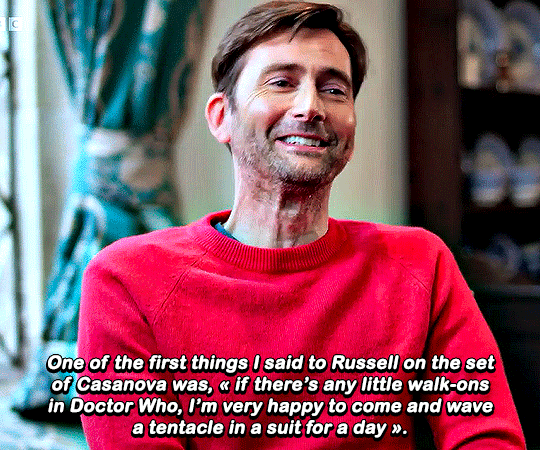
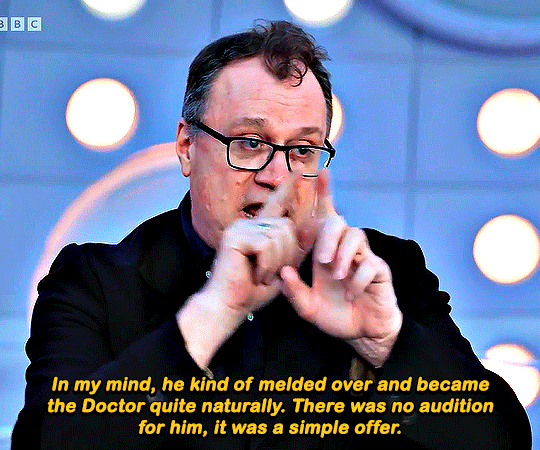
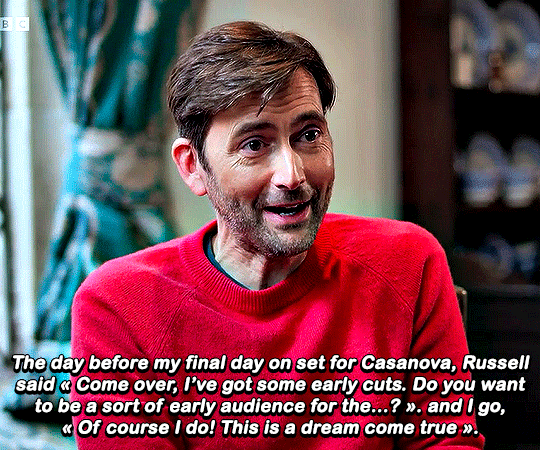

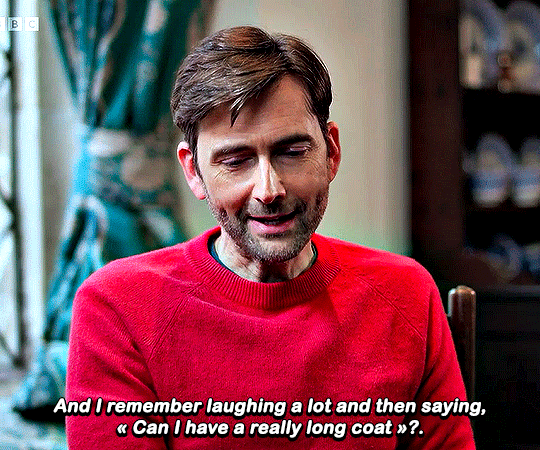
Imagine … Russell T Davies: The Doctor and Me (2023)
#doctor who#russell t davies#david tennant#dwedit#imagine...#timelordgifs#userdiana#byaurore#usersugar#userbbelcher#userelio#usereena#userisaiah#tuserpris#tuserhan#userzo#jemmablossom#userrlaura#arhurpendragonns#alivedean#i'm falling asleep i don't even know what i'm giffing anymore
6K notes
·
View notes
Text
Moffat’s Great Gamble

Over its lifetime, Doctor Who has accumulated an ample and varied stable of villains, monsters, and baddies. Some are more successful than others. The Daleks were an overnight sensation spreading Dalek mania across the UK. The Cybermen were burned into every Whovian’s mind after proving too much for the Doctor, kickstarting the first regeneration. However, one of the more surprisingly successful baddies was the Weeping Angels. Having been introduced in one of the Doctor-light episodes most writers usually avoided, their overnight success must have been a pleasant surprise at the BBC. Overnight, the phrase “Don’t blink,” became as iconic as “Exterminate!” The next question, of course, was- can lightning strike twice?
It wouldn’t be until three years later that newly appointed showrunner Steven Moffat would put them to the test. A common practice within Doctor Who, when bringing back popular baddies, is to up the ante. Usually, this is done by establishing new abilities and/or technological advancements. Long gone are the days when Daleks were powered by static electricity. No longer can you escape their plunger’s grasp by ascending a flight of stairs. In a similar fashion, one of Moffat’s first steps was to address similar shortcomings of the angels. The next step was also a common one- going bigger.
Unlike the Doctor-light affair that was “Blink,” the return of the Weeping Angels demanded a bigger budget and lots more Doctor. So much so, that it actually required two whole episodes to tell the story. Adding to the grandeur was the exciting reappearance of River Song who had yet to return after her first story with the Tenth Doctor. It’s safe to assume that a lot was riding on the success of this story as it was the first they ever filmed with Matt Smith. An excerpt from the script was also used while auditioning for the role of Amy Pond. In many ways, this was the proof of concept for Moffat’s entire run on Doctor Who. Can the show continue outside the hulking shadow of Russell T Davies and David Tennant?
It’s important to me when revisiting older Doctor Who episodes to try and remember what we the audience knew at the time. When reviewing the First Doctor’s initial stories, I tried to imagine what it was like to walk into the TARDIS for the first time. We’re so used to that old phone box being bigger on the inside that we can forget its initial splendour. Knowing that River Song is Amy and Rory’s daughter and the Doctor’s wife can make us forget that at one point, she was a mystery. I find it important to remember these things because they can colour our memories with hindsight bias.
My initial reaction to River Song was one of frustration. In making the Doctor and her constantly meet in the opposite direction, much of the chemistry between River and the Doctor is merely implied. We’re told about these great adventures when being shown is far more interesting. It feels akin to falling out with a TV show only to jump back on two seasons later and discover a brand-new main character you know nothing about. There’s a sort of grudge against the new guy because they’re unfamiliar to you. In some ways, both Moffat and Alex Kingston lean into this frustration. This adds a bit of something to River as a character. She’s flirty, a bit of a mystery, and very possibly dangerous. It can also subtract from her character as it makes her feel less established and vague.
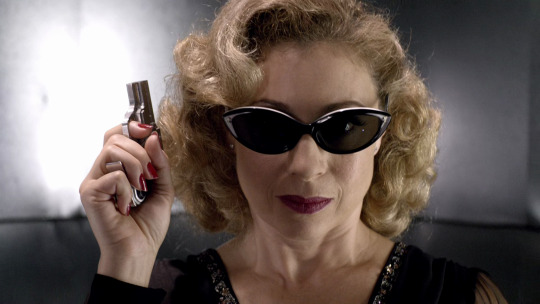
Something I have always admired about Steven Moffat’s era of Doctor Who is that he was one of the few writers to really play with the concept of time travel. It’s no wonder that “wibbly wobbly timey wimey,” is one of his lines. Even a Comic Relief short like “Time,” does more with the concept than a lot of other writers. It makes sense that Moffat would play with the concept of two time travellers always meeting out of sync. The problem is that while this gimmick is creative, it’s not incredibly interesting to hear about. I’ve said it before, and I’ll say it again- I don’t care about Jim the Fish. However, this time around, I found myself pleasantly surprised by River Song, and this is largely due to the fact that I know who she is now. If I were to think of her in the same vein as I did those initial First Doctor serials, I would probably still voice the same frustrations. But Alex Kingston is fun, and ultimately, so is River.
While I’m on the subject of River, I would like to mention one bit that still boils my blood, and those of you familiar with this story may already know what I am about to say. While watching River fly the TARDIS with her fuck me pumps hanging from the console is very cool, I can’t stand the joke about the parking brake. I’ve had people defend this joke as clearly being a gag, but I just can’t go there. My geek brain can’t divorce the joke from the history of the show. That would mean that every Time Lord in the history of the show is so bad at piloting a TARDIS that they too leave their parking brakes on. Furthermore, it’s shown to be more than a joke because as River lands the TARDIS, it doesn’t make that fantastic sound. I know this is incredibly pedantic, but I hate it. The only way forward is to ignore it like I would ignore the Doctor being half-human on his mother’s side or the majority of the Chibnall era.
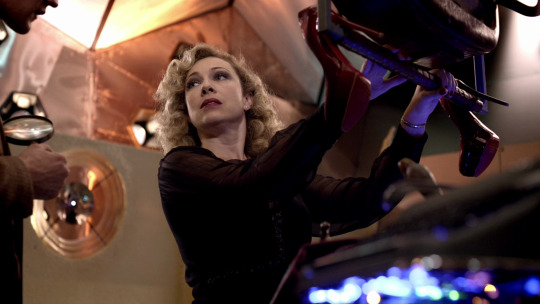
After River’s iconic entrance, we’re given a glimpse into how this new era of Doctor Who will work. Much of this story functions in the same manner as a classic UNIT story. The Doctor is the difficult genius helping a team of soldiers and scientists, while Amy is the audience experiencing the danger on a human level. Much like Sally Sparrow, we experience the toll the Weeping Angels take through her dusty eyes. The fan reactions to the Weeping Angels are challenged here when Amy’s quick-witted idea of winking as opposed to blinking is undermined by an angel imprinting itself within Amy’s eye.
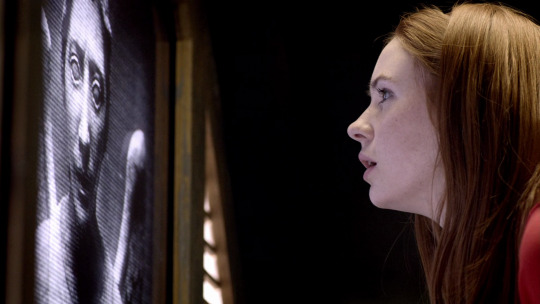
Writers don’t always make characters more dangerous when reintroducing them. Adding more rules isn’t always as effective as creating more dangerous conditions. Too many rules can bog a story down. After years of changing hands between writers, Superman’s powers became so numerous that he bordered on stupidly overpowered. I am happy then that Steven Moffat did a little bit of both. While he does indeed give the Weeping Angels more powers, he also ups the ante by placing our heroes in a more dangerous situation. Instead of an old house full of a few angels, why not an ancient ruin full of hundreds of them? That will do it.
When I first watched this story, I had originally been quite turned off by the idea of the image of an angel becoming an angel, but now I feel a bit differently. You can tell that Steven Moffat thought about the ways these deadly hunters might adapt. If you can stop them by looking at them, then they’ll compel you to look them in the eye thus imprinting themselves. Steven Moffat’s bread and butter are these little areas where he can turn the mundane into danger. Stay out of shadows because they’ll clean your bones dry. Forget a monster the moment you look away. And whatever you do, don’t blink. These are the thoughts of a writer who sat around as a child thinking about Doctor Who. Every one of Moffat’s wibbly wobbly proclivities is the product of growing up a geeky little boy reading Target novels and pondering the implications of time travel.
While Matt Smith is one of my favourite Doctors, I do feel like it’s obvious this is his first outing as the Doctor. There’s a bit toward the end where I feel his Doctor comes across as too angry. Though this is hard to gauge as much of this adventure would be incredibly stressful. You do get an implication, however, of the type of Doctor we would see more of in the Capaldi era. In this story, the Doctor comes off as more authoritative and bossy than usual. By the time they got around to filming “The Eleventh Hour,” he seems much more comfortable in the role. It’s not hard to see how I was instantly endeared to him as the Doctor. He was able to get any stumbles out of the way by the end of filming “Flesh and Stone.”
A stand-out of this story would have to be Iain Glen as Father Octavian. In the future, the Catholic Church becomes more of a military than a religion. It’s a bit muddled how any of it operates, but this doesn’t detract from Glen’s performance. It wasn’t until researching for this review that I realised this role pre-dates his role as Ser Jorah Mormont from Game of Thrones by about a year. I thought his role had been a cameo fresh off the buzz of his HBO fame. Mind you, I didn’t see this episode as it aired. It wasn’t until season six that I got to actually watch Doctor Who in real-time. I was still working my way through David Tennant at this point.
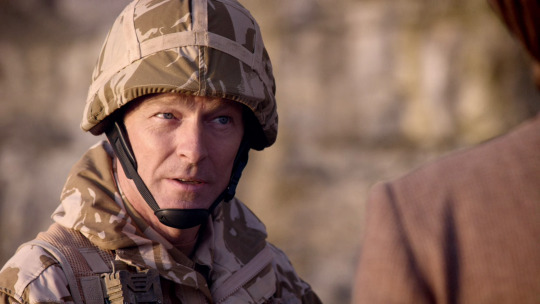
Another cameo I appreciated more than most was that of Mike Skinner as the soldier tripping balls on River’s psychedelic lipstick. In the early 2000’s I was a bit of a fan of the Streets, so it was cool to see him if even for a moment. He’s also a bit of perfect casting as seeing him whacked out like “darlings on Charlie,” was appropriate for his brand. It’s also a great reintroduction to River Song. It’s established that she goes around getting into danger and escaping it with relative ease. Whoever River Song is, she’s dangerous. However, I don’t exactly understand any of what I’m seeing on Byzantium leading up to her and the Doctor’s reunion. I love the idea that the Doctor keeps score by visiting museums. And I like the idea that this futuristic ship full of James Bond villains crashed 12,000 years ago. But I don’t understand why she’s there or much of anything else.
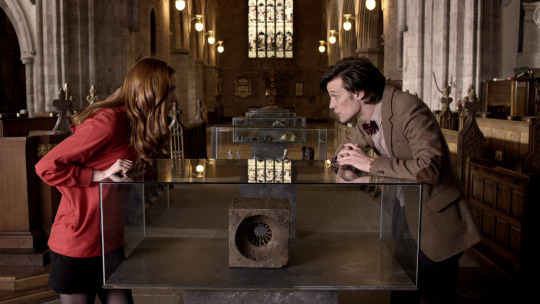
We know that the Byzantium is now crashlanded on Alfalva Metraxis, and its radioactive core is feeding a group of long-dormant Weeping Angels. And this is about as far as Steven Moffat wants us to think about it. River’s transition from spy thriller nightwear to military fatigues is about as fluid as the show’s shift in tone. A couple of throw-away lines of dialogue and suddenly River is GI Jane. It’s not a very elegant transition considering you might miss it altogether. But like I said, Moffat seems more interested in progressing the story. It’s less important how or why we’re in a giant ruin full of Weeping Angels. What’s important to know is that we’re in a giant ruin full of Weeping Angels.
The soldiers work much like they always do in UNIT-type stories- as fodder to be thrown into the gnashers of great evil. There’s some brilliant character work with the Doctor comforting Scared Bob. He also uses this opportunity to bring Father Octavian down a peg or two by implying that it would be stupid to underestimate the angels. This is driven home and amped up all the more by revealing the native species of Alfalva Metraxis had two heads, implying that every statue with only one head is actually a Weeping Angel, eroded by centuries of entropy. It’s nice to be reminded that all you need to do to illustrate the danger of a threat is to place the protagonists in a dangerous situation. I’m not exactly scared of a tiger at a zoo, but if it the jungle, that changes things a bit. You don’t need to give tigers lasers to make them scarier, you just need to place them in an environment advantageous to tigers. It also helps if there are a shitload of them.
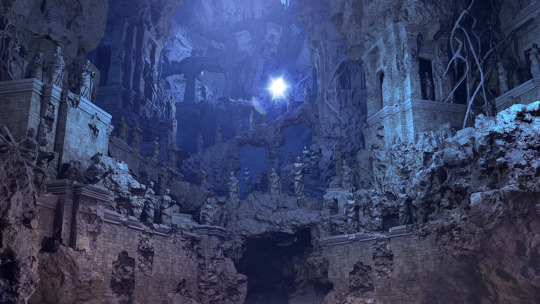
With the new reality of their situation in mind, our protagonists are reasonably terrified. Soldiers begin shooting wildly. It would be easy to let the story fall away into action schlock, but ever present is the grounding role that is Amy. Karen Gillan should really be commended for nailing her character so early. There is a vulnerability to her performance here that feels thoughtful. As a person who experiences infrequent eye problems, I can attest to how they can completely occupy your awareness. Much like her performance in “The Girl Who Waited,” Gillan uses her physicality and posture to a great degree. You never forget that something is going wrong with Amy, which creates a persistent unease. The audience is unable to relax because Amy is in trouble.
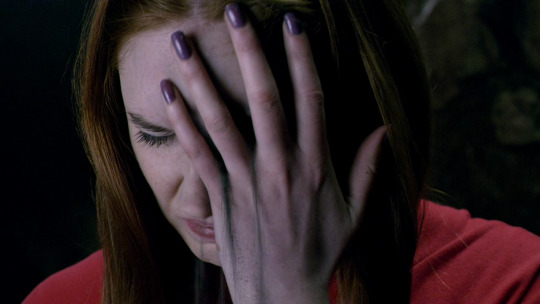
It’s this sense of dread that carries a lot of this story in sections where it drags. Like a lot of multi-part Doctor Who stories, they feel too long for one episode, and too short for two. A big chunk of the story is given to the Doctor’s conversations with the hijacked consciousness of Bob after the angels snapped his neck. Angel Bob chimes in intermittently to demoralise the lads and establish exposition. It’s an okay device, but out of all of the angels’ new powers, this one is my least favourite. I’m not sure the angels ever needed voices, and in some ways, it makes them less terrifying. This isn’t a Davros moment where the angels have suddenly established their own dictator. It’s closer to learning the inner thoughts of an unknowable horror. Eldritch abominations lose a bit of their edge when you learn they’re not above schoolboy taunts.

Being generous though, I’m going to chalk it up to the fact that the Angels aren’t at full strength. They would need to conserve energy by employing cruder forms of warfare. I suppose my main gripe is that it feels like when Eric Cartman has the power to have every power. I’ve griped about this in previous reviews about the Moffat era’s tendency toward giving villains new and perplexing powers. Like the Zygons turning people into big balls of hair. Or the Ice Warriors and their guns that fold people like beach towels. If this episode is the overture for the grand opus that is the Moffat era, then you can see why problems began to form. Oneupsmanship can be exciting, but it can also be a crutch. It is a form of sensationalism and it can also deflate actual dramatic tension by either elucidating too much or pushing things too far.
Regardless of how I feel about the inclusion of “every power” the Angel Bob segments are still creepy. David Atkins gives a strong interpretation of a naïve soldier being twisted into something cruel. The fact that he’s able to get so much out of voiceover work is impressive. I’m surprised he’s not had a bigger career. Hell, not even Big Finish has used him. Much like Amy’s story arc, Angel Bob gives to the horror movie element of the story. When comparing this story to “Blink,” you could draw parallels to the Alien franchise. The first story is a smaller-scale budget horror while the next installment was more of an action blockbuster. Where the comparison breaks down, however, is that this isn’t an action story after all. It’s more like the story of “Predator,” where a group of soldiers fresh off the set of a Canon film walk directly into a slasher movie. Doctor Who has never told a straight military story. Even when the Doctor worked for UNIT it was usually beside them than with them.
The fact that the military in this story is the Catholic church is an interesting choice, thematically. Angels vs the Church, very big brain Steven, bravo. I do have to scratch my head imagining the sequence of events that would cause the Catholic Church to pivot from systematic abuse toward forming a military… oh wait, I answered my own question. It does muddy the waters a bit with regard to certain characters’ motivations. Father Octavian feels like a man of deep conviction, but if the Catholic Church has pivoted toward becoming a military, does he pray with bullets? Is the G-Man upstairs still part of the equation? Are these priests one with the holy spirit or is that all balderdash in their time? Maybe nobody else gives a shit about these questions, but they’re things that nibble at the back of my mind, distracting me. I can’t be the only one.

Moffat has said in interviews that when he pens a two-part story, he endeavours to begin the second half of the story in a different location or circumstance. He was frustrated by the way “The Doctor Dances,” simply picked up where “An Empty Child,” left off. You can see this in the way “Silence in the Library,” ends in the library, whereas “Forest of the Dead,” begins with Donna living in a house under the care of Dr Moon. I’m not really sure why this is such a big deal for Moffat. It’s like how Simpsons episodes start in one place and end up in a drastically different location. There’s no rule that the second part of a story can’t pick up where the first left off any more than the guarantee that the opposite will be interesting. What’s interesting then is that this story does a bit of both.
Having ended with Matt Smith’s rather cool speech about being the last thing you want to put into a trap, it was a bit of a mystery as to where we would end up in the second half. Having shot a set of gravity stabilisers on the Byzantium, the Doctor and company were able to fall upward to the gravity of the ship’s surface. But this is only a stopgap from the onslaught of Angels growing evermore powerful from the ship’s radiation. The slick interior of the Byzantium stands in stark contrast to the eroding temple below, giving us that Moffat point of difference. On a horror level going from a broken temple to a polished spaceship is a bit of a downgrade. It’s not like the Nostromo with its hanging chains and dark corridors. But don’t you worry, the Byzantium has a forest inside it!

There’s something very Moffat about going from a ruin to a ship, to a dark forest. The forest is arguably the first place we found ourselves naked and afraid. If you’ve ever walked through a dark forest on a moonless night, you know a bit of the animal terror that preys on your brain. Your eyes begin to trick you as you peer in vain to distinguish shadows of trees from shadows of predators. Imagine then that those shadows may be a group of hungry statues with the power to send you back in time to live under Thatcher. Terrifying. I know for a fact that this situation would be scary as it was the most effective part of the walk-through section of the Doctor Who Experience. Even at 30, I didn’t want the Weeping Angels statues to touch me. I think that speaks truth to the lasting terror of Moffat’s most infamous creations.
Things get worse for our heroes when the crack in time and space from young Amy’s bedroom wall makes a cameo. However, this time instead of having the giant eye of the Atraxi inside, we’re greeted by a hungry force of broken spacetime eager to heal itself by feeding on people’s lives. It does so by enticing the priests into its light like an angler fish. As the men go one by one to inspect this phenomenon, it erases them from existence, with the only one seeming to remember being Amy. The Doctor later explains this by telling her she remembers the men because she’s a time traveller now. This makes enough sense in the moment, but falls apart when Amy can’t seem to remember Rory, a fellow time traveller to whom she’s been engaged for some time.

The Doctor, River, and Octavian work their way through the Byzantium while leaving Amy behind. The need arises after Amy’s condition has progressed to the point that she is started to see things that aren’t real. After she begins to think her body is turning to stone, only the sting of the Doctor’s bite can convince her that she is still flesh and blood. Even more worrying is that Amy has begun slowly counting down from ten and doesn’t even notice herself doing it. It’s genius then that the one way for Amy to survive this encounter with the Weeping Angels is by doing the one thing you’re not supposed to do- closing her eyes. Once again, it’s the type of situational intensification that works so much more for me than tiger lasers. The pinnacle of this story arc comes in the form of Amy having to navigate past a group of angels as though she were still able to see. If the angels think she can see them, they might behave as though she can see them.
At the time, I remember murmurs in the fandom from people who were upset to see the angels move in this scene. I can see their argument a bit. It’s a bit like knowing their thoughts in that seeing them move makes them feel a bit less scary. The fact that we never see how fast they move or what moving may look like gives them a monstrous feeling. Personally, I don’t really mind. It worked for me the first time around and I still find it rather fun. The stone-against-stone sound they make as their heads look toward Amy is cute. Does it break the fundamental rules of the Weeping Angels? A bit yeah. The fact that they kind of move here says that maybe the angels aren’t quantum-locked at that moment. It implies that maybe they’re standing still because they expect they can’t actually move. It’s a case where the unknown leads to interesting questions as opposed to distracting ones. Moffat is transferring the way he experienced Doctor Who as a boy into his writing.
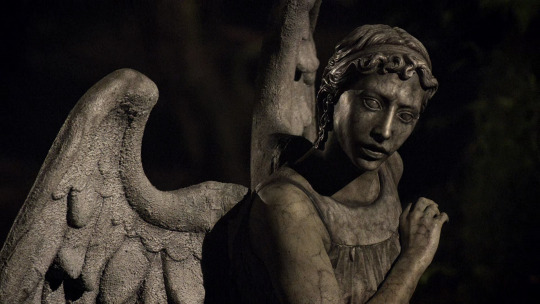
One element that really bothers me is the way in which Father Octavian dies. With so many variables to now worry about, the Doctor is really feeling the pressure. Amy is close to death. The angels are progressing. The crack is getting bigger. And there are lives at stake. What bothers me is that the Doctor gets lost in thought about the crack’s ability to erase people out of existence. I find it annoying that the most they can find for the Doctor to do in this moment is flap his hands about while piecing together that time can be rewritten- a fact that the Doctor has stated on numerous occasions in the past. He gets so involved with this train of thought that he completely misses that Father Octavian is about to be outflanked by a Weeping Angel. It’s nice that Father Octavian has a brave and dignified death, but I am offended that it was because the Doctor was busy figuring out the blatantly obvious. It’s one of the moments I felt was a bit of a misstep for this new Doctor. Sure, the Doctor is prone to get lost in thought, and the Doctor does occasionally get people killed. But this was possibly one of the dumbest reasons ever. Octavian’s death is played like a sacrifice, but it was a very unnecessary one.

The answer to all of the Doctor’s problems is of course right in front of him. I sort of like the way the angels try to goad the Doctor into dying for them. It’s as if in their own sick manner, they are attempting to use the Doctor’s ethos of self-sacrifice to save even their rotten existence. The Doctor is having none of this though, as a group of Weeping Angels would be just as satisfying a meal to a time anomaly as would a Time Lord with years of time travel under his belt. The fact that the angels even tried this tactic makes them feel alien. Like they misunderstand compassion so much that they think of self-sacrifice as an exploitable weakness. I like that even in giving the angels the ability to speak, they do still retain a bit of their esoteric inscrutability.
Putting his big Time Lord brain to work, the Doctor comes to another obvious conclusion- if messing with gravity worked the first time, why not a second time? In the spirit of Indiana Jones chopping a rope bridge, the Doctor cuts the gravity long enough to feed the Weeping Angels to the crack in the wall, satiating its hunger enough to seal the crack once more. This moment is also a nice call back to the scene where the Doctor jumps down into the Byzantium which changes his centre of gravity. What seemed like a cute little moment of sci-fi fun with perspective and physics was actually the loaded gun ready to go off in the third act. I love it when Doctor Who does that. It’s like how throughout all of season four you hear about planets disappearing, a trope almost as old as the science fiction genre, and discovering that it’s actually a huge plot element in the finale.

While the Doctor still doesn’t trust River, it's interesting then that she returns to the Storm Cage. Whoever it is that she murdered, it was someone she respected enough to believe she belongs in prison. With nobody around to physically take River back to her cell, she still makes no attempt to escape the smokey teleportation beam. If they were ever trying to make us think River had murdered anyone other than the Doctor, I would be surprised. It seems pretty easy to imagine that it’s the Doctor. I think the only way they could have subverted expectations is for it to have not been the Doctor. You can even tell in the way the Doctor asks River who it was that she killed that he already knows the answer. There’s an interesting dichotomy set in motion where River knows she killed the Doctor, and the Doctor knows River died to save his life. It’s one aspect where the concept of two people meeting in two different directions can be very fulfilling.
As a proof of concept for the Moffat era goes, I would say this was a success. Steven Moffat wasn’t just working to establish his brand of Doctor Who, he was working to keep the show afloat. This was a Patrick Troughton moment in that much of the show’s future hinged on its success. I know I make it sound as though I am treating this like it was the actual first story that aired, but as I said before, it was the first story they filmed. They needed to nail this one in order to move forward. And it wasn’t just about whether stories about the Eleventh Doctor or River could replace the Tenth Doctor or Captain Jack. It was about whether the era could maintain the momentum of the Russell T Davies era. If everything were to all change from what came before, would it make or break the show? I think we can proclaim that yes, lightning can strike twice.
#Doctor Who#Flesh and Stone#The Time of Angels#Steven Moffat#Eleventh Doctor#Matt Smith#Amy Pond#Karen Gillan#River Song#Alex Kingston#season 5#BBC#TARDIS#Weeping Angels#Father Octavian#Iain Glen#Time and Time Again#timeagainreviews
34 notes
·
View notes